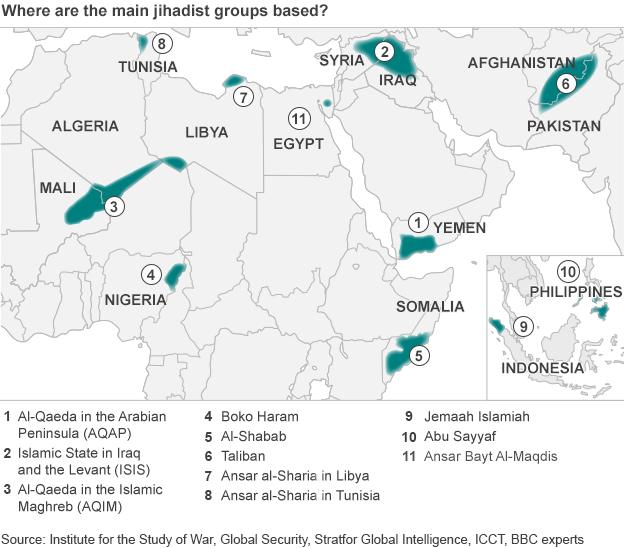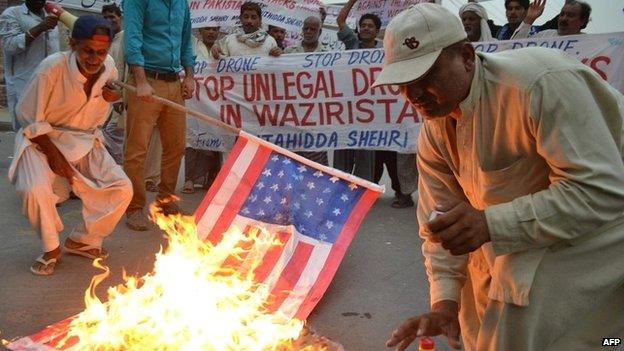Jihadist groups around the world
- Published

Despite Osama Bin Laden's death in 2011, the organisation that he founded is still wreaking havoc
Nearly 13 years on from the devastating 9/11 attacks by al-Qaeda, the group, its affiliates and other jihadist groups are still in business. So who are they? And how, despite such a vast multinational effort, has this happened?
There is little left of the original al-Qaeda organisation as founded in 1989 by Abdullah Azzam and Osama Bin Laden in the wake of the Soviet Union's withdrawal from Afghanistan. Bin Laden himself was tracked down and killed in Pakistan in 2011.
His successor, an uncharismatic and reclusive Egyptian surgeon called Ayman Zawahiri, is still at large, issuing occasional statements online but criticised by jihadists for being increasingly irrelevant to today's fast-moving events.
A large number of al-Qaeda's leaders and commanders have been captured or killed over the last decade, many by controversial air strikes by unmanned aerial drones.
What is left of "Core al-Qaeda", as it is known, is believed to be based in Pakistan's tribal region after fleeing Afghanistan in 2001.
But the world's counter-terrorism officials have little cause to celebrate.
Rather than eliminating al-Qaeda, they have caused it to atomise and disperse, morphing into several different organisations around the Middle East, Africa and Asia, with large numbers of jihadist sympathisers in Europe.



Terrorist attacks have continued, although not on the scale of 9/11.
So what is sustaining the global jihadist phenomenon? The list below is by no means comprehensive but these are some of the drivers explaining why al-Qaeda's global appeal has yet to evaporate.

National and regional grievances

Boko Haram in Nigeria is one of many regional groups that have morphed into jihadist movements
From the Sahara to the southern Philippines there are local, national and regional grievances that have given rise to jihadist organisations, often with tenuous or even non-existent links to al-Qaeda's central leadership.
In Nigeria, for example, Boko Haram started out as a largely political and religious movement to promote the rights of Muslims in northern Nigeria but turned increasingly violent after 2009.
In Yemen, al-Qaeda in the Arabian Peninsula (AQAP) has been able to capitalise on the turmoil and security vacuum engendered by the Arab Spring upheavals of 2011, moving into undergoverned territory to bring a swift brand of justice as well as carrying out attacks on government positions.

Bad governance
This is really one of the prime drivers towards extremism. In Muslim-majority countries where national governments and their security forces are viewed as corrupt, predatory and abusive, it is easy for jihadist recruiters to find volunteers.
When those governments are perceived as having a cosy, supportive relationship with the US and the West, it becomes even easier for al-Qaeda's followers to recruit.

Revenge

Civilian casualties caused by US drone strikes in Pakistan and Yemen have helped jihadist groups recruit fighters
Again, this is a powerful tool for recruitment. US drone strikes in Pakistan and Yemen, which have killed large numbers of jihadist plotters and planners, have also killed civilians including women and children, prompting calls for revenge.
Eleven years after it led the invasion of Iraq, America remains a target for many, and it is perceived by large numbers of people in the Arab world as the source of much of the region's troubles.
Many recruits to global jihadism are prompted by a sense that their religion has been discriminated against, oppressed or insulted.

Personal issues
Many of the most fanatical adherents of al-Qaeda's violent West-hating worldview are young men looking for a role, a purpose, in life.
Some European jihadists are converts or have had troubled adolescences, getting into trouble with the police.
Spells in prison often leave them more radicalised than when they went in. Nearly all have a highly negative view of government authority.